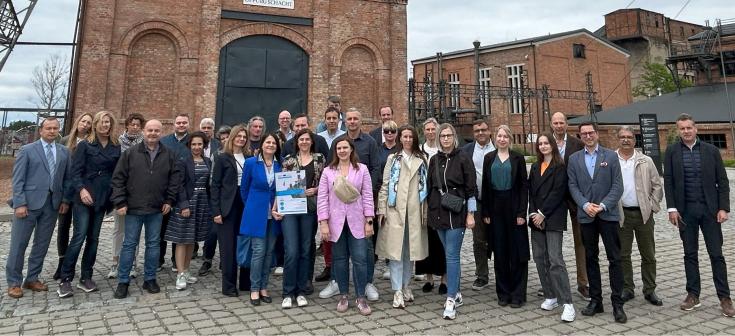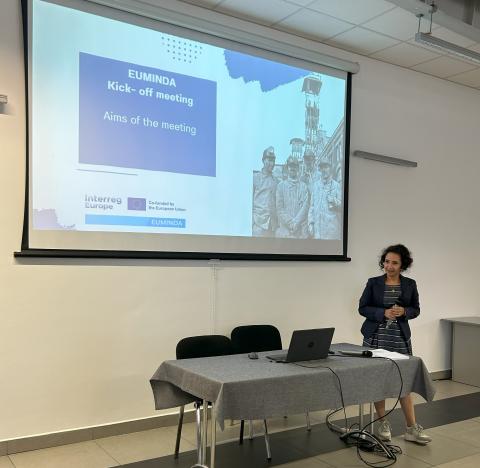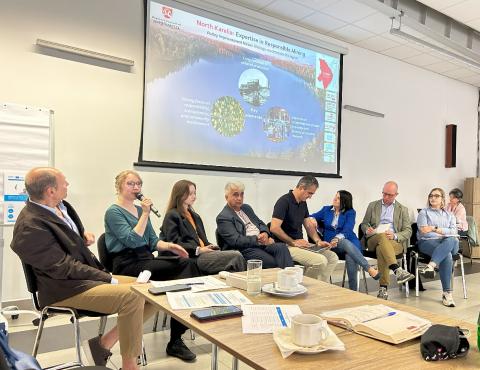Launch of the Interreg EUMINDA Project in Katowice, Poland

Launch of the Interreg EUMINDA Project: A New Approach to Revitalizing Mining Regions in Europe
Twelve partners from nine European countries will contribute their experience, knowledge, and energy to identify new ways of improving public policies to promote economic growth in areas affected by mining activities.
Between June 10–12, 2025, the city of Katowice, Poland, hosted the launch meeting of the Interreg EUMINDA project—an ambitious initiative aimed at improving public policy instruments in European mining regions. The event brought together 35 participants, including decision-makers and experts, to lay the foundations for interregional cooperation that seeks to turn the challenges of mining legacies into opportunities for sustainable development.
The first day of the conference was dedicated to exploring the industrial heritage of Katowice, including former mining lands surrounding the Kopalnia Katowice site. On the second day, participants traveled to the Ignacy mine in Rybnik, where key presentations took place, including the opening speech by project leader Anna Bronzes (Open Universiteit), the presentation "The EUMINDA Story" by Lorand Deme, and a regional discussion panel with project partners. Good practices in post-mining revitalization from the Silesian Voivodeship were also highlighted.

The third day was dedicated exclusively to project partners, featuring strategic sessions held at the Central Mining Institute. During this meeting, the project timeline, the SQA research methodology, and the communication strategy were presented, including the launch of social media channels and the approval of the project motto:
Recognize the past. Repair the damage. Reimagine the future.
EUMINDA: A Solution for Mining Communities in Europe
Over 50 coal mining regions currently exist in 17 European countries. However, as part of the EU’s accelerated energy transition, raw material extraction is being gradually phased out, leading to many active, abandoned, or repurposed mines—with long-term environmental and social consequences, unresolved liability issues, and mono-industrial communities left behind.

EUMINDA aims to influence policies that contribute to the principle of a just transition by better recognizing, balancing, and repairing the long-term damages and legacies of mining (MDL) on society and the environment.
These long-term mining legacies are addressed through three intersecting challenge themes: legal aspects, socio-economic concerns, and sustainability, taking into account past, present, and/or planned activities along the mining transition timeline.
The Interreg EUMINDA project addresses the long-term impact of mining activities on society and the environment, aiming to influence public policies for a fair and sustainable transition.
The initiative brings together 12 partners from the Netherlands, Poland, Romania, Greece, Czech Republic, Spain, Finland, Ukraine, and Bosnia and Herzegovina, with the goal of developing effective strategies for managing mining areas.
With a budget of €2,291,345 and an implementation period from 2025 to 2029, EUMINDA focuses on three main themes: legal aspects, socio-economic concerns, and sustainability. Through interregional cooperation and knowledge exchange, the project will facilitate the development of locally adapted policies and support mining communities in their revitalization process.
Project leaders emphasize the importance of an integrated approach designed to balance the impact of the industrial past with sustainable development prospects.
“EUMINDA provides an essential framework for knowledge exchange and the implementation of sustainable solutions, contributing to reimagining the future of Europe’s mining regions,” said Anna Bronzes.
For more information about the project, visit interregeurope.eu/EUMINDA
